Key takeaways:
- Mastering SQL fundamentals, such as tables and relationships, is crucial for effective data management and enhances problem-solving capabilities.
- SQL skills facilitate better communication within teams, enabling clearer presentations of data insights and fostering collaboration.
- Consistent practice and continuous learning through hands-on projects, online courses, and community engagement are essential for developing SQL proficiency.
- Optimizing queries through techniques like indexing and analyzing execution plans significantly improves database performance and user satisfaction.
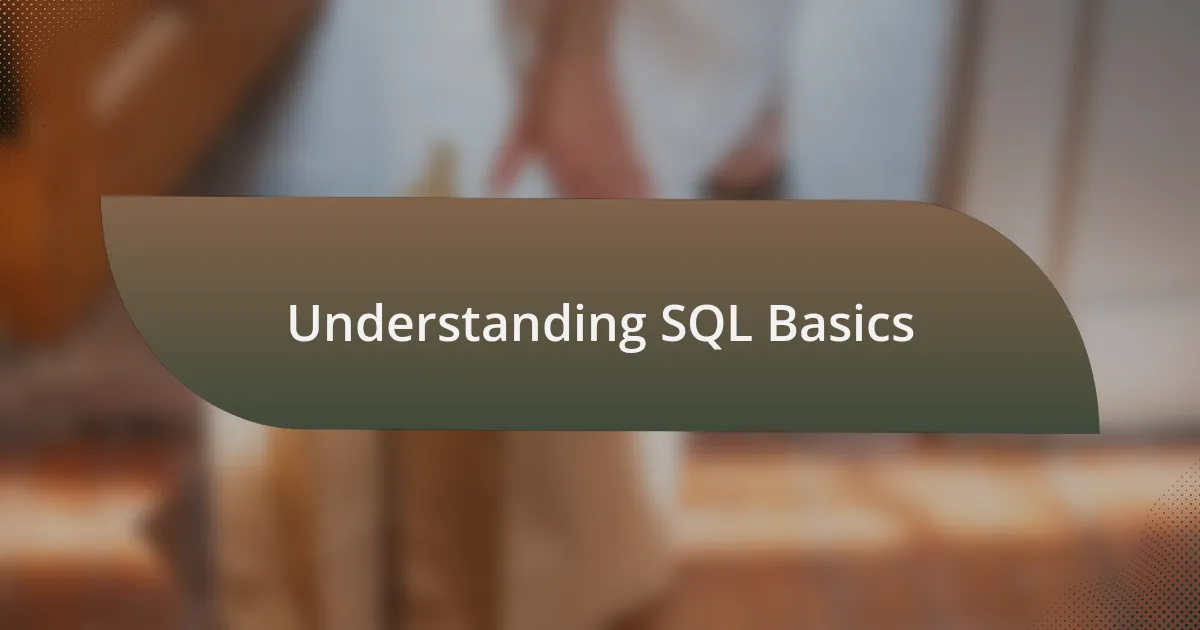
Understanding SQL Basics
Understanding SQL basics is essential for anyone venturing into the world of databases. When I first encountered SQL, I was struck by the simplicity of its syntax. Queries like SELECT, INSERT, and UPDATE felt intuitively straightforward, yet they held the key to unlocking vast amounts of data. Have you ever experienced that moment of clarity when the seemingly complex suddenly makes sense?
As I honed my SQL skills, I realized that foundational concepts, such as tables and relationships, are the backbone of effective data management. Each table, much like a chapter in a book, tells a specific story with its rows and columns. I vividly remember the satisfaction I felt when I crafted my first JOIN query, connecting disparate pieces of information into a coherent whole. It was a small victory, but it ignited my passion for exploring database structures further.
Knowing the basics is just the starting point. Have you thought about how mastering these concepts can transform your data handling capabilities? As I delved deeper, I discovered that things like normalization and indexing aren’t just buzzwords; they’re crucial for improving query performance and data integrity. I still recall the awe I felt watching my complex queries run seamlessly after implementing these principles. The key is to practice consistently, making every small detail count as you build your SQL proficiency.
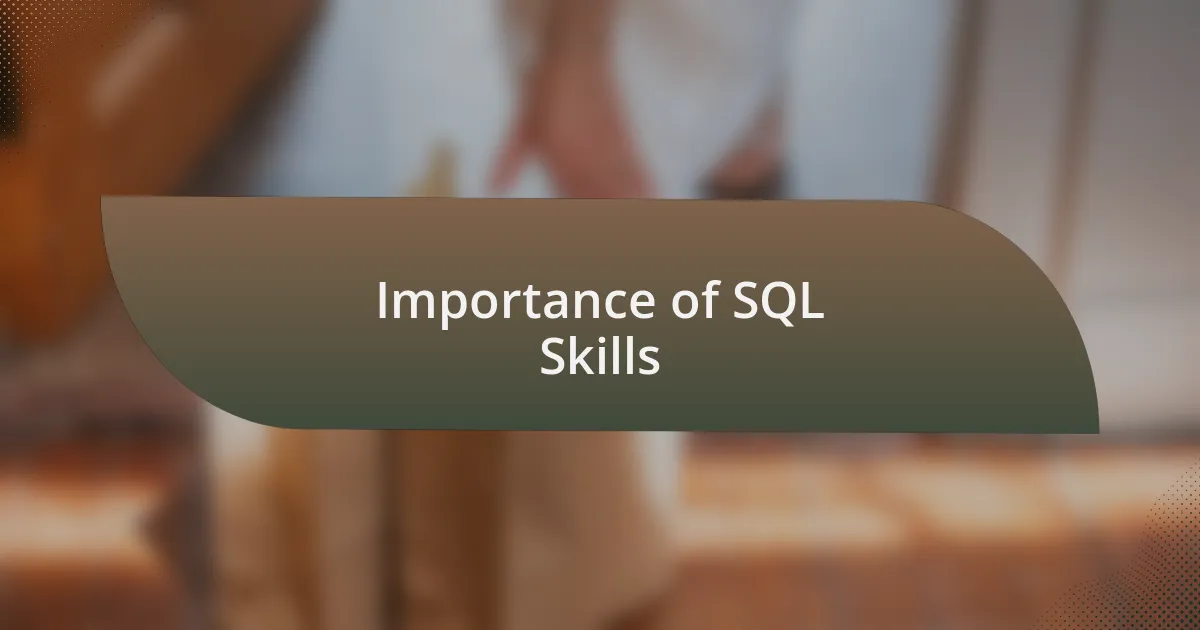
Importance of SQL Skills
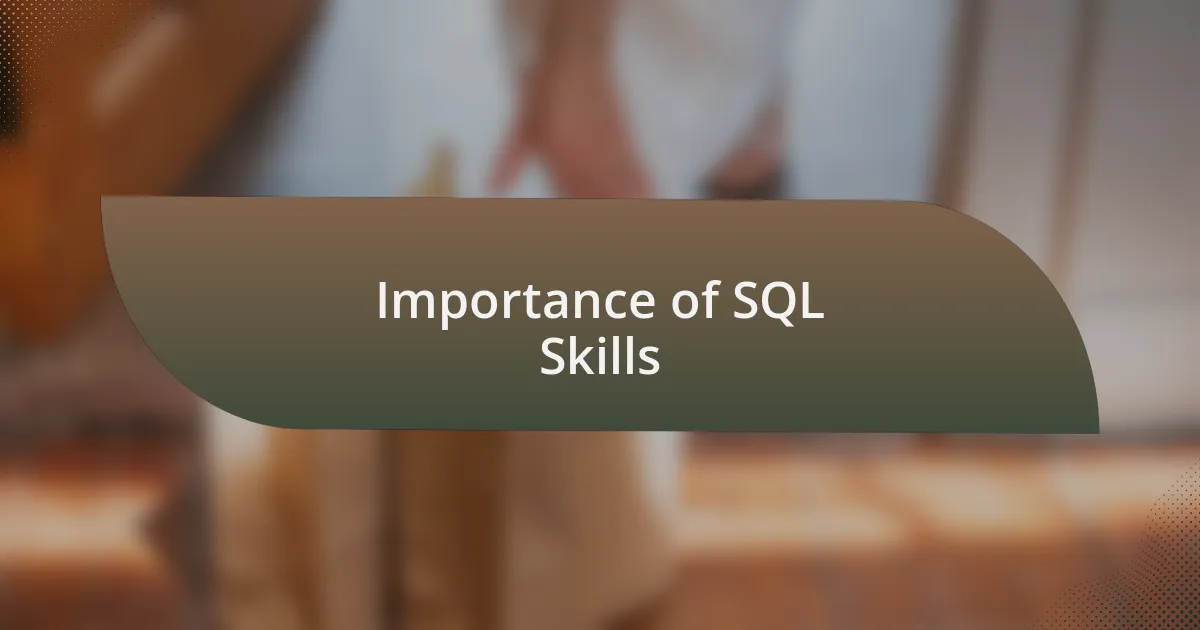
Importance of SQL Skills
SQL skills are crucial for anyone looking to excel in data-driven environments. I’ve always found that being proficient in SQL opens up countless opportunities, especially when it comes to data analysis and reporting. Have you ever had a moment when you realized that the ability to extract insights from data could directly impact business decisions? For me, it was enlightening to see how a well-structured SQL query could shine a light on trends that were previously hidden.
Understanding SQL not only enhances technical capabilities but also fosters better communication with colleagues. There were times when I struggled to convey complex data concepts to non-technical team members. However, once I cultivated my SQL skills, I found it easier to present data findings in ways everyone could comprehend, which often led to more constructive discussions. Isn’t it rewarding when everyone is on the same page and can collaborate effectively?
Moreover, SQL knowledge allows developers to build more efficient applications. I recall working on a project where I optimized database queries that significantly reduced loading times. This experience reinforced my understanding that database efficiency directly correlates with user satisfaction. If we can make applications faster, why wouldn’t we invest in refining our SQL skills?

Techniques for SQL Optimization
One technique that has immensely improved my SQL optimization skills is indexing. Initially, I didn’t grasp the true power of indexes until I encountered a query that was running painfully slow. By adding an index to the relevant columns, I transformed a multi-second delay into near-instantaneous responses. Have you ever felt the frustration of waiting for data retrieval? It was a game changer for me, illustrating how simple adjustments can yield significant performance boosts.
I also learned the value of query restructuring. In one project, I noticed that combining multiple queries into a single, well-crafted statement not only streamlined the execution but also reduced the load on the database. Sometimes, I wonder if many developers overlook this aspect, believing more lines of code means more clarity. I found that thoughtful restructuring can actually lead to clearer and faster results, making it a win-win for both the developer and the end-user.
Another key aspect of optimization that I can’t emphasize enough is the importance of analyzing execution plans. There’s something fascinating about being able to peek under the hood of a SQL query, unraveling how the database engine processes it. In my experience, diving into execution plans has often revealed hidden bottlenecks that I wouldn’t have noticed otherwise. Have you ever taken the time to analyze an execution plan? It can be eye-opening and invaluable for pinpointing specific areas where efficiency can be enhanced.
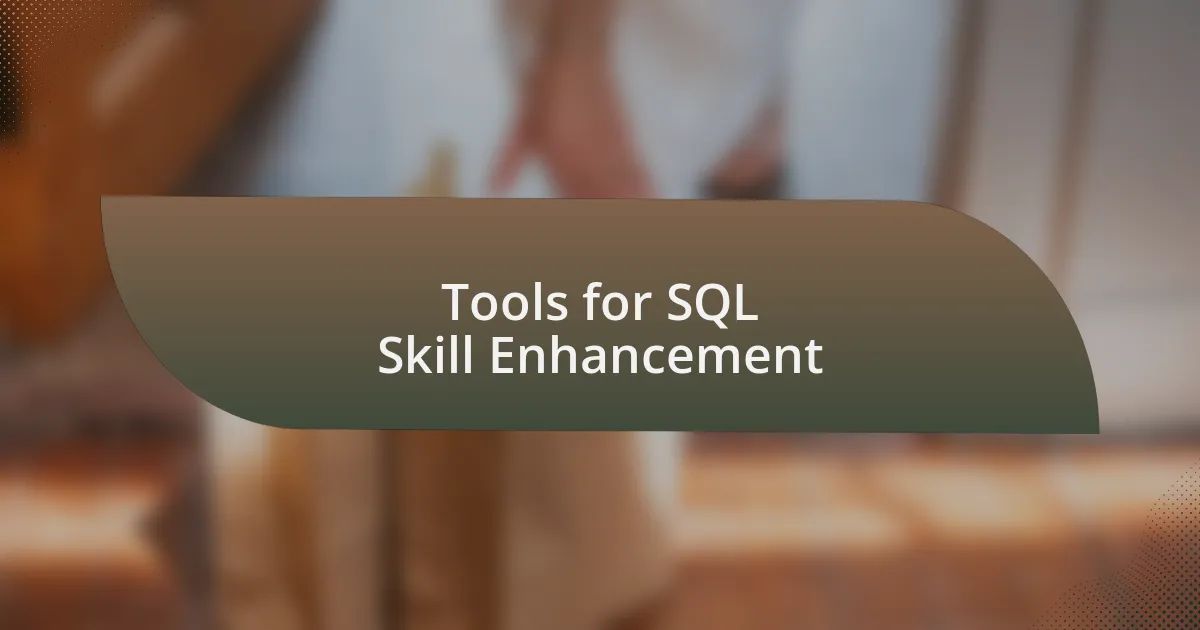
Tools for SQL Skill Enhancement
When it comes to enhancing my SQL skills, one tool that has significantly contributed to my journey is SQL Server Management Studio (SSMS). Its user-friendly interface allows me to write and execute queries while visualizing data structures with ease. I vividly remember my early days of wrestling with complex queries; SSMS made it feel less daunting, almost like having a reliable friend guiding me through the intricacies of SQL. Have you found a tool that feels like your personal mentor?
In addition to SSMS, online platforms like LeetCode and HackerRank have been game changers for honing my problem-solving skills. They offer a range of SQL challenges that cater to various skill levels. I still recall how tackling a particularly tricky problem late at night led to an exhilarating breakthrough—a moment that reinforced my belief in continuous learning. It makes me wonder, how often do we push ourselves out of our comfort zones to grow?
Lastly, I can’t overlook the impact of comprehensive documentation tools like Dataedo on my SQL development. These tools help in maintaining clear documentation of the databases I work with, ensuring that knowledge is shared among team members and preserved for future reference. I once spent hours searching for definitions and relationships between tables; the clarity that documentation provides not only saves time but fosters collaboration. How have you managed to keep your SQL projects organized?

Personal Experience with SQL Challenges
Diving headfirst into SQL challenges often felt like navigating a labyrinth, especially during the early stages of my learning journey. I still recall a specific instance when a seemingly simple INNER JOIN query turned into a three-hour standoff. Frustration mounted, and I questioned my abilities. But when that query finally executed successfully, it was a rush—proof that perseverance truly pays off. Have you ever faced a similar moment where you almost gave up?
One of the most formidable challenges I encountered revolved around optimizing complex queries for efficiency. I often found myself missing performance benchmarks, which was disheartening. However, after researching execution plans and indexes, a light bulb moment emerged: I understood how to analyze and improve query performance. It’s fascinating how deriving insights from my setbacks pushed me to deeper knowledge, wouldn’t you agree?
Then there were the times when I had to troubleshoot database errors during late-night coding sessions. Each error message felt like a puzzle begging to be solved. I remember one night specifically; after hours of digging, I learned that a misconfigured index was the culprit. The thrill of solving that problem gave me a sense of empowerment, reinforcing my understanding of SQL. Have you ever felt that elation when unraveling a particularly sticky database issue?
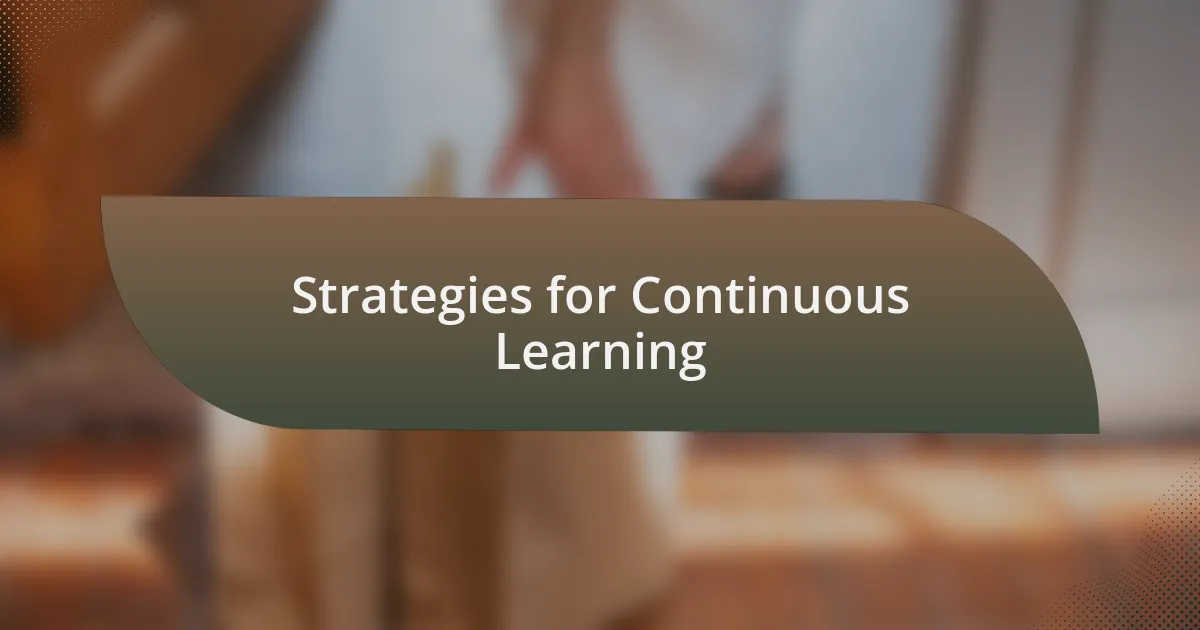
Strategies for Continuous Learning
To continue evolving my SQL skills, I embraced a habit of setting aside dedicated time each week for learning. I subscribed to online courses and followed tutorials that challenged me in new ways. It’s remarkable how structured learning can ignite curiosity—have you found that having a schedule can keep your motivation alive?
I’ve also found that participating in online communities significantly enhances my understanding. Engaging with peers allowed me to ask questions, share insights, and even learn from others’ experiences. When I shared a particularly tricky query solution in a forum, the appreciation I received made me realize the power of collaboration—do you think sharing knowledge can accelerate the learning process?
Moreover, I’ve learned the value of hands-on practice. I often recreate real-world scenarios using sample databases; it feels exhilarating to put theory into action. Each time I build a new SQL project, I’m reminded of my growth journey. What’s your go-to method for solidifying new skills through practice?
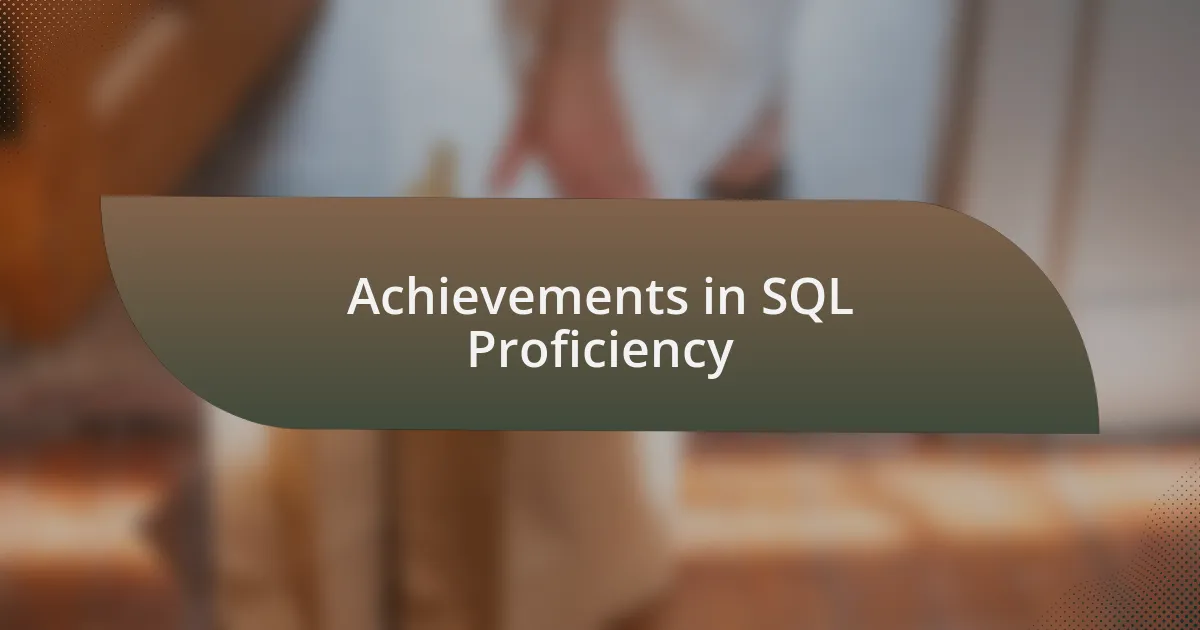
Achievements in SQL Proficiency
One of my proudest achievements in SQL was optimizing a slow-running query in a previous project. I remember feeling frustrated as I watched my colleagues struggle with performance issues. After diving into the execution plan and making targeted adjustments, such as indexing crucial columns, I witnessed a remarkable reduction in query time. It was satisfying not only to resolve the issue but also to see my efforts appreciated during our team meeting.
Another milestone was when I successfully transitioned a complicated database schema into a more streamlined design. I had spent countless hours analyzing data flow, which was a daunting task at first. However, when I presented the revamped structure to my team and saw the excitement on their faces, I realized I had truly taken my SQL skills to the next level. Hasn’t it happened to you that a moment of clarity leads to an unexpected breakthrough?
Additionally, participating in SQL certification courses had a profound impact on my proficiency. The intricate concepts I once found overwhelming slowly began to click, and the feeling of accomplishment after passing each exam was unbeatable. Reflecting on this journey, it feels rewarding to know that my dedication has not only sharpened my SQL expertise but also opened doors for new opportunities in my career. What aspects of your learning journey have brought you the most satisfaction?